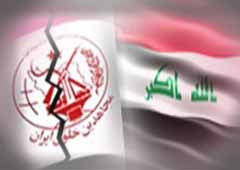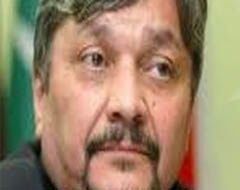A senior Iraqi legislator underlined Baghdad’s firm decision on the expulsion of the anti-Iran terrorist Mojahedin-e Khalq Organization (MKO) from Iraq, and called on Tehran to release the documents of the crimes of the terrorist group to inform the world public opinion of the MKO’s terrorist nature. "We want to create a new Iraq and it is necessary that all terrorist groups, including the MKO, be expelled from Iraq to this end," Abdolhossein Abtan said in a meeting with Seyed Mohammad Javad Hasheminejad, the secretary-general of Iran’s Habilian Association – a human rights group formed by the families of 17,000 terror victims in Iran.
"You and we should sooner decide about the fate of the terrorist organization of the MKO and therefore it is necessary that efficient revelations be made about the crimes of the organization, specially about what they did during the (Iraqi Shiite’s) Intifada, to further inform the public opinion."
He pointed to the crimes committed by the MKO members in Kalar city in the Iraqi Kurdistan region, and said, "I myself witnessed their crimes."
The MKO, whose main stronghold is in Iraq, is blacklisted by much of the international community, including the United States.
Before an overture by the EU, the MKO was on the European Union’s list of terrorist organizations subject to an EU-wide assets freeze. Yet, the MKO puppet leader, Maryam Rajavi, who has residency in France, regularly visited Brussels and despite the ban enjoyed full freedom in Europe.
The MKO is behind a slew of assassinations and bombings inside Iran, a number of EU parliamentarians said in a recent letter in which they slammed a British court decision to remove the MKO from the British terror list. The EU officials also added that the group has no public support within Iran because of their role in helping Saddam Hussein in the Iraqi imposed war on Iran (1980-1988).
The group started assassination of the citizens and officials after the revolution in a bid to take control of the newly established Islamic Republic. It killed several of Iran’s new leaders in the early years after the revolution, including the then President, Mohammad Ali Rajayee, Prime Minister, Mohammad Javad Bahonar and the Judiciary Chief, Mohammad Hossein Beheshti who were killed in bomb attacks by MKO members in 1981.
The group fled to Iraq in 1986, where it was protected by Saddam Hussein and where it helped the Iraqi dictator suppress Shiite and Kurd uprisings in the country.
The terrorist group joined Saddam’s army during the Iraqi imposed war on Iran (1980-1988) and helped Saddam and killed thousands of Iranian civilians and soldiers during the US-backed Iraqi imposed war on Iran.
Since the 2003 US invasion of Iraq, the group, which now adheres to a pro-free-market philosophy, has been strongly backed by neo-conservatives in the United States, who also argue for the MKO to be taken off the US terror list.
Meantime, earlier media report said that the US is trying to convince Iraqi officials to relocate MKO members within Iraq.
Under the US plan, the approximately 3,400 residents of Camp Ashraf would be temporarily relocated within Iraq, farther from the border with Iran, a US State Department official announced.
The relocation would be temporary, the official said, with final settlement of the inhabitants in other countries.
That would not include the United States, the official said, "Since US law bars anyone associated with a terrorist organization from settling there".
Since the beginning of this year, the Baghdad government has repeatedly assured Iranian officials and people that it is determined to expel the MKO from Iraq by the end of 2011.
"Expulsion of the MKO from Iraq’s soil and termination of its presence which has lasted for several years is a definite decision," Iraqi Government Spokesman Ali Al-Dabbaq told FNA in April, adding, "The MKO will be expelled from Iraq by the end of the current year."
"The only option for the members of the MKO is leaving Iraq and they have no other choice," he reiterated.
Reminding to the black record of the terrorist group and its crimes against the Iraqi people, Dabbaq said, "Collaboration with the former Iraqi dictator and massacre of thousands of our people is just part of their crimes".
Dabbaq announced in early April that the cabinet is determined to shut down Camp Ashraf located North of the capital, Baghdad, and disband the terrorist group.
"The council of ministers has committed to implement an earlier decision about disbanding the terrorist group by the end of this year at the latest, and the necessity of getting it out of Iraq," the official noted.


